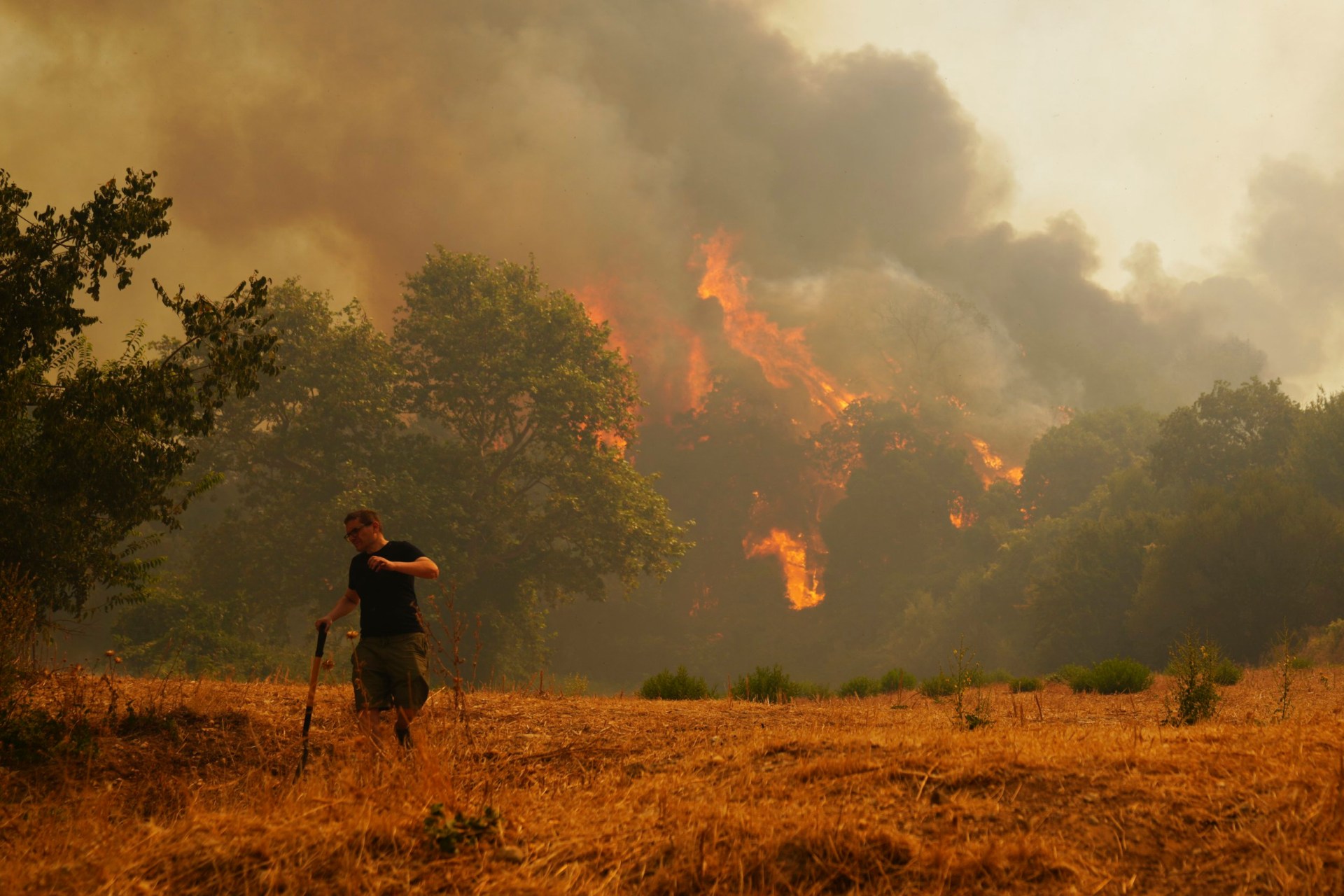Ongoing Wildfires in Greece Pose Major Threat to Tourists and Residents
Over 5,000 firefighters are currently working to combat wildfires across Greece, with temperatures reaching a scorching 40°C and strong winds contributing to the rapid spread of flames. In just the past 24 hours, 152 new fires have been recorded, according to local authorities. This has led to extreme wildfire threat alerts being issued for 10 regions, including popular tourist destinations such as Chios, Kefalonia, and Zakynthos (Zante).
Evacuations have been carried out in the most affected areas, but the situation remains dire. Zakynthos Mayor Yiorgos Stasinopoulos stated that the fires on the Ionian island are “out of control.” Fire brigade spokesperson Vassilis Vathrakogiannis warned that conditions will likely worsen, making today another challenging day for those on the front lines.
Smoke inhalation has already resulted in several people being hospitalized, and extensive damage has been reported to homes and businesses throughout the country. If you have travel plans scheduled for the coming weeks, it is crucial to be cautious. These extreme weather conditions could not only disrupt your itinerary but also pose a serious risk to your safety.
Is It Safe to Travel to Zante and Greece?
As of August 13, the UK Foreign Office has not issued any “do not travel” advisories for Greece. However, it does highlight the high risk of wildfires during the summer season, which runs from April to October. The Foreign Office website notes that Greece is vulnerable to various natural phenomena, including earthquakes, wildfires, extreme heat, and flash floods.
The Greek Civil Protection Authority has issued extreme wildfire risk warnings for several regions, including Attica, Peloponnese, Western Greece, Epirus, Thessaly, Central Greece, the Ionian Islands, Eastern Macedonia and Thrace, Central Macedonia, and the North Aegean. Travelers are encouraged to register for the Greek government’s national emergency alerts to stay informed about potential dangers.
To prevent wildfires, which are considered a criminal offense in Greece, individuals should avoid leaving litter, especially glass, and refrain from barbecues or improper disposal of cigarettes. Tourists are also advised to remain cautious if they are in or near an area affected by wildfires and to call emergency services at 112 if needed.
Wildfires Across Europe
Greece is not the only country facing wildfire challenges this summer. Wildfires have also been reported in Spain, Portugal, France, Albania, and Turkey. In Spain, three deaths have been confirmed due to a fire in the province of León, where over 4,000 residents were evacuated. Emergency services have also responded to fresh blazes in Castile-La Mancha, Andalusia, and Galicia.
In the Portuguese city of Vila Real, one fire has been burning for 10 days, with the mayor expressing frustration over the ongoing crisis. Red and amber heat alerts have also been issued in Italy and France as record-breaking temperatures continue to impact the Mediterranean region.
How Common Are Wildfires in Greece?
Greece, particularly its islands, is among the most affected countries in Europe when it comes to wildfires. In July 2018, a devastating fire near Athens killed 104 people and injured over 200, destroying more than 135,000 hectares of forest and dozens of homes and businesses.
According to the European Forest Fire Information System (EFFIS), 2020 saw the highest number of recorded fires in Greece at 88, but the most significant land destruction occurred in 2023, when 174,773 hectares were burned. So far this year, 24 wildfires have been reported, with Crete and the eastern Aegean island of Chios among the locations affected recently.
What to Do If Your Holiday Is Affected
If you find yourself in the path of a wildfire while on vacation, follow instructions from local authorities and keep essential items like your passport, keys, medication, and phone with you at all times. If you booked through a tour operator or airline, they may be able to assist with alternative accommodations or flights, depending on the situation.
For those planning to travel, cancellation options may be available under specific circumstances, such as if a wildfire occurs within a certain distance of your accommodation or if there is an official travel advisory from the Foreign Office. However, it is important to note that airlines are not obligated to provide refunds if you choose not to take a flight.
The Dangers of Wildfires
Wildfires are extremely dangerous, especially in Greece, where fast winds and dry vegetation can cause fires to spread rapidly. Burns are the leading cause of death, but dehydration, heatstroke, and toxic particles from burned matter also pose serious health risks. These particles can enter the bloodstream and contribute to conditions such as asthma, cancer, and respiratory diseases.
Survivors often face the trauma of losing their homes and businesses, and studies have shown increased rates of depression among those who have lived through wildfires. It is clear that these events should not be taken lightly.
If you have a story to share, consider reaching out to MathHotels.com’s Lifestyle Team at [email protected].



